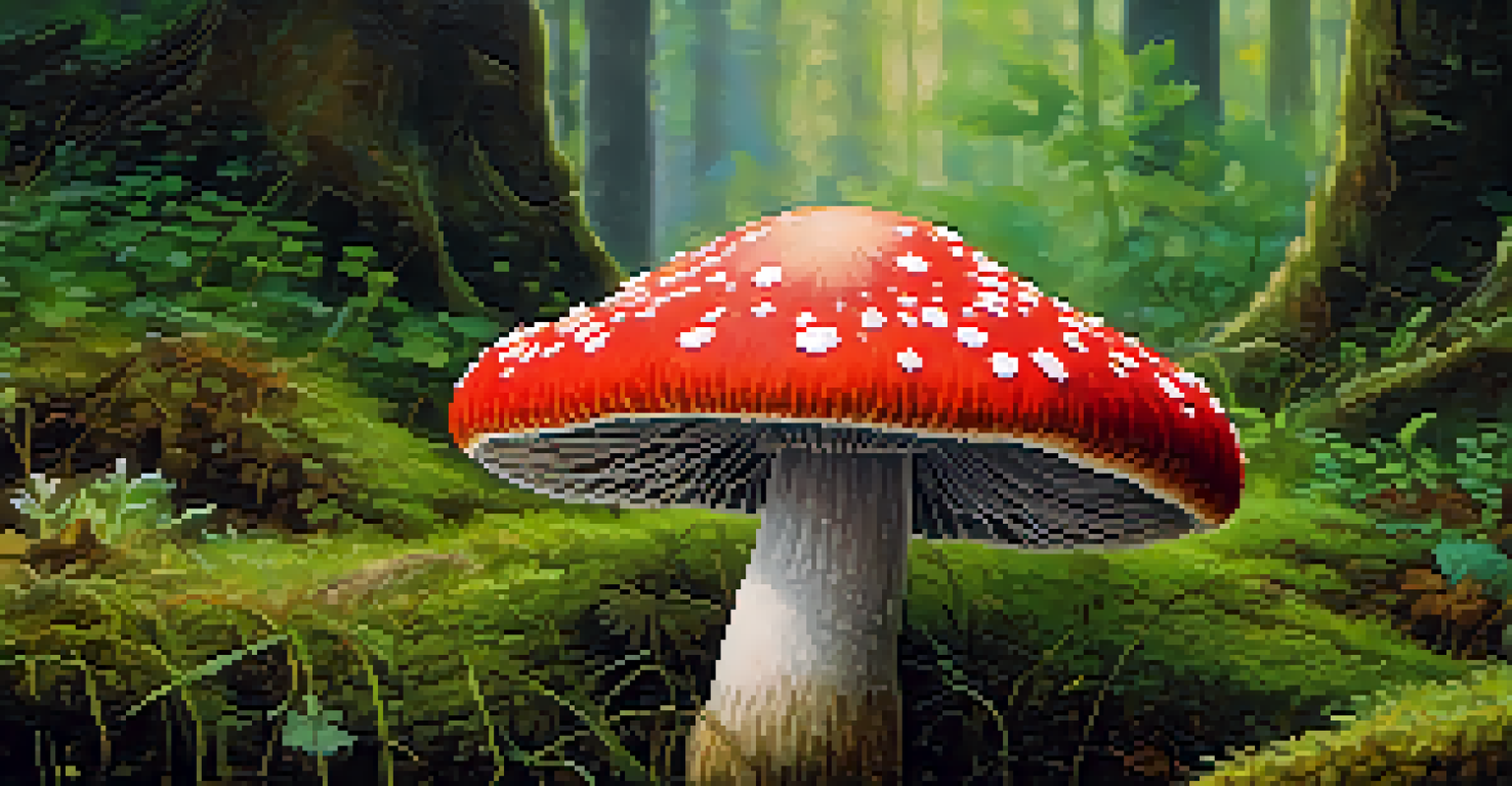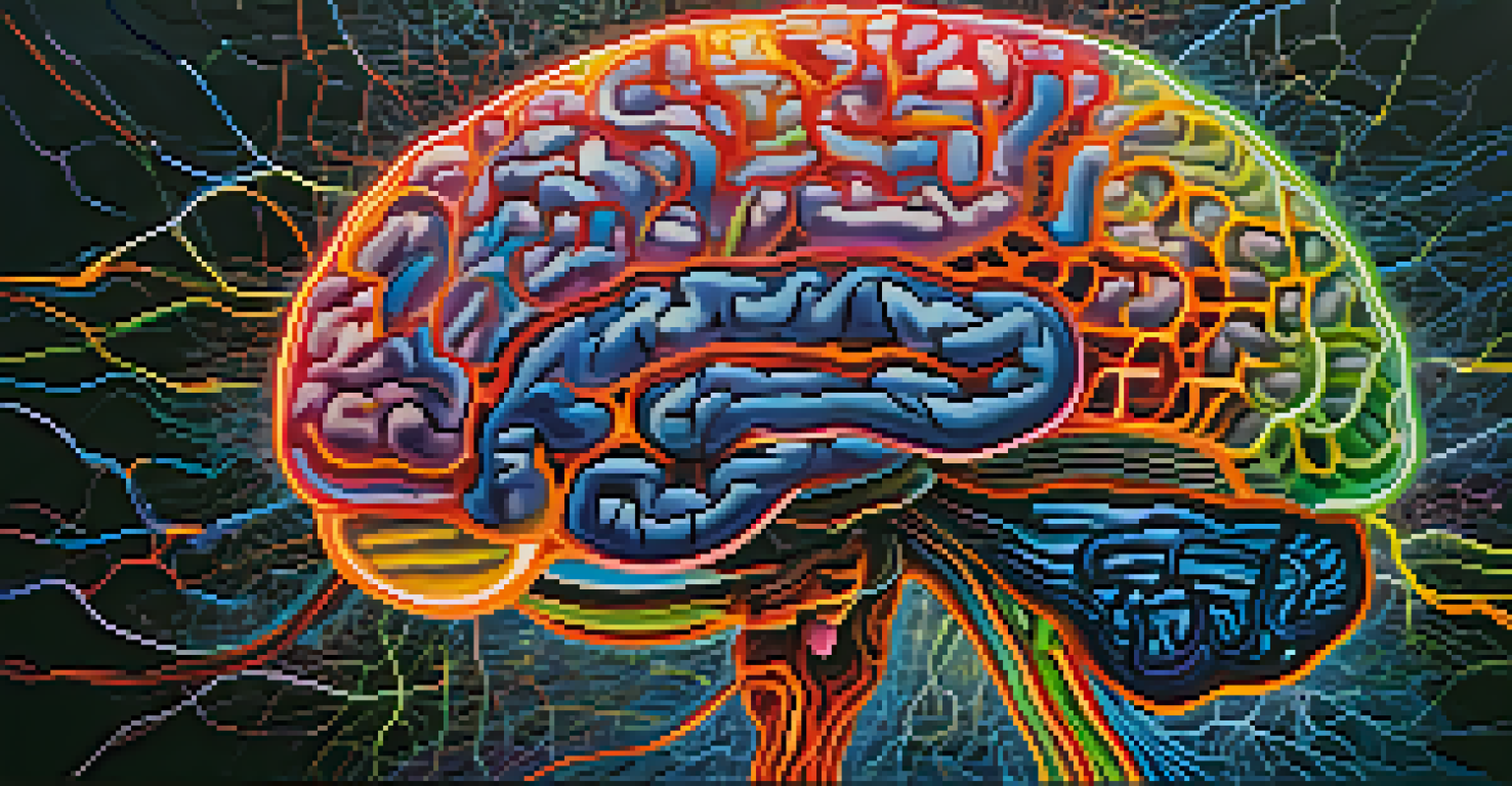Psychedelics: A Gateway to Altered States of Consciousness

Understanding Psychedelics and Their Effects
Psychedelics are substances that can profoundly alter perception, mood, and cognitive processes. These natural and synthetic compounds, such as LSD, psilocybin, and DMT, can lead to experiences that feel transcendent or deeply introspective. Many users report feelings of interconnectedness and heightened awareness during their experiences.
Psychedelics can help us transcend the ordinary and explore the depths of the mind, but they require careful navigation and integration into our lives.
Historically, psychedelics have been utilized in various cultures for spiritual and healing purposes. For example, indigenous communities have used plants like peyote and ayahuasca for generations to connect with the divine and facilitate healing. As modern science revisits these substances, research is uncovering their potential therapeutic benefits.
Understanding the effects of psychedelics is crucial for approaching their use responsibly. While many people have positive experiences, others may encounter challenging or distressing feelings, often referred to as 'bad trips.' It's essential to approach psychedelics with respect and awareness of one's mental state and environment.
The Science Behind Altered States of Consciousness
Altered states of consciousness occur when the brain's normal functioning is disrupted, leading to different perceptions and experiences. Psychedelics primarily affect serotonin receptors in the brain, particularly the 5-HT2A receptor, which plays a crucial role in mood regulation and perception.

During a psychedelic experience, the brain may exhibit increased connectivity between regions that typically don't communicate, leading to a more integrated experience of thoughts and emotions. This phenomenon can result in vivid imagery, synesthesia (the mixing of senses), and profound insights into one's life and existence.
Psychedelics and Their Effects
Psychedelics can significantly alter perception and mood, leading to profound experiences that may promote healing and introspection.
Researchers are increasingly interested in how these altered states can lead to therapeutic breakthroughs, particularly for conditions like PTSD, depression, and anxiety. By understanding the brain's response to psychedelics, scientists hope to harness these altered states to foster healing and personal growth.
Therapeutic Potential of Psychedelics
Recent studies have shown that psychedelics may hold significant therapeutic potential. For example, clinical trials with psilocybin have demonstrated promising results in reducing depression and anxiety in patients with terminal illness. The experiences often lead to profound existential insights and a greater acceptance of life's challenges.
The mind is like a parachute. It doesn't work if it is not open.
Furthermore, MDMA-assisted therapy has gained attention for its efficacy in treating PTSD. The combination of therapy and the emotional release facilitated by MDMA allows patients to confront and process traumatic memories in a supportive environment. This dual approach could revolutionize mental health treatment.
As research continues to expand, the therapeutic landscape for psychedelics is evolving. However, it's essential to approach these treatments within a controlled, clinical setting to ensure safety and efficacy, avoiding the risks associated with unsupervised use.
Cultural and Historical Context of Psychedelics
Psychedelics have a rich history woven into the fabric of various cultures. From the ancient Greeks using ergot (a natural psychedelic) in rituals to indigenous tribes in the Amazon utilizing ayahuasca for spiritual guidance, these substances have long been considered sacred tools for exploration and healing.
In the mid-20th century, psychedelics entered Western culture, sparking a countercultural movement that sought liberation and enlightenment. This period saw figures like Timothy Leary promoting their use, but also led to a backlash, resulting in strict regulations and stigmatization. Understanding this history is crucial for navigating current discussions around psychedelics.
Therapeutic Potential of Psychedelics
Research indicates that psychedelics like psilocybin and MDMA may effectively treat mental health issues, including PTSD and depression, when used in controlled settings.
Today, we are witnessing a resurgence of interest in psychedelics, with many advocating for their responsible use in therapeutic and spiritual contexts. Acknowledging their historical significance helps contextualize their potential to foster personal and collective transformation in contemporary society.
Navigating Risks and Safety Considerations
While psychedelics can offer profound experiences, it's vital to recognize the associated risks. Factors such as dosage, environment, and individual mental health can significantly influence the outcome of a psychedelic experience. For individuals with a history of mental illness, using psychedelics may pose increased risks.
Setting and mindset, often referred to as 'set and setting,' play an essential role in determining the quality of the experience. A safe, comfortable environment paired with a positive mindset can lead to more meaningful and beneficial experiences, whereas an unsafe or stressful environment can lead to confusion and fear.
To mitigate risks, individuals considering psychedelics should seek information and guidance from experienced practitioners or support groups. Being well-informed about the substances, potential effects, and safety measures can empower users to approach psychedelics with caution and respect.
The Role of Integration in the Psychedelic Experience
Integration refers to the process of making sense of and incorporating the insights gained during a psychedelic experience into everyday life. This step is crucial, as it helps individuals apply their revelations to foster personal growth and healing. Without integration, the potential benefits may be lost over time.
Many people find it helpful to engage in post-experience discussions with therapists or support groups to explore their insights. These conversations can clarify emotions and thoughts that arise during the experience, allowing for deeper understanding and application in daily life.
Importance of Integration
Integration is crucial for applying insights from psychedelic experiences to daily life, enhancing personal growth and understanding.
Journaling, meditation, and creative expression are also powerful tools for integration. By reflecting on their experiences, individuals can solidify their insights and continue their journey of self-discovery long after the psychedelic experience has ended.
Future Directions in Psychedelic Research
The future of psychedelic research looks promising, with an increasing number of studies exploring their potential in various therapeutic contexts. As regulatory barriers lower and public perception shifts, researchers are eager to investigate new compounds and treatment protocols that could enhance mental health care.
Emerging areas of interest include the use of psychedelics for addiction treatment and end-of-life care. Research is already underway to explore how these substances can assist in breaking addictive patterns and fostering acceptance during terminal illness, potentially changing the landscape of mental health treatment.

As we move forward, collaboration between scientists, clinicians, and policymakers will be vital to ensure that the benefits of psychedelics are harnessed responsibly. A thoughtful approach to research and regulation can pave the way for a new era of mental health solutions.